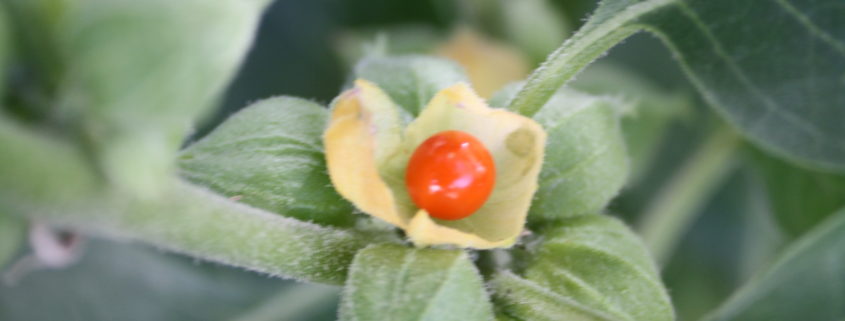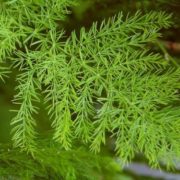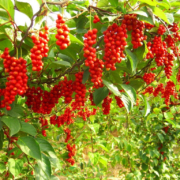Ashwagandha
Botanical Name: withania somnifera
Other Names: Winter cherry, Indian ginseng
Description: a small woody shrub resembling eggplant. It has yellow/green flowers yielding small orange/red berries in the fall. The leaves are dull green and oval-shaped. Native to Africa, India and the Mediterranean, ashwagandha prefers dry, subtropical climates. Ashwa means horse and gandha means smell. Its Sanskrit name loosely translates to “horse essence, suggesting strength & stamina.
Family: Solanaceae
Parts Used: primarily the root, but leaves, seeds and fruit also have history of topical use
Energetics: warming, dry, sweet, bitter, pungent
Actions: calming adaptogen, reproductive tonic, aphrodisiac, anti-inflammatory, antispasmodic, anxiolytic, immunomodulatory, thermogenic, antitussive, galactagogue, sedative, stimulant
Uses: In Ayurveda, ashwagandha is a Rasayana, or a rejuvenative tonic that promotes longevity and overall wellness. Ashwagandha promotes memory and cognition, protects against neurodegenerative disorders, and boosts GABA, promoting neural growth and repair. It is high in iron and can build blood when there is deficiency. It nourishes ojas, increasing sperm count and libido. And it directly nourishes the thyroid gland, making it useful for hypo-thyroid conditions. It calms you down while giving you more energy, helpful for when people have insomnia due to adrenal fatigue. It regulates sleep cycles over time and facilitates a more restful sleep in the long-term. As an immunomodulatory, it can strengthen a weak immune response or calm down a hyper immune response.
Indications: general debility, low libido & fertility, nervous exhaustion, convalescence, arthritis, anxiety, insomnia, neurodegenerative diseases (Alzheimer’s, Parkinson’s, Multiple Sclerosis), loss of memory, loss of muscle, tissue deficiency, autoimmune conditions effecting the muscles & joints (rheumatoid arthritis), iron-deficiency, hypothyroid, general tonic for graceful aging.
Contraindications: Ashwagandha is generally safe when used as recommended, though large doses have been known to cause gastrointestinal upset and have abortifacient effects. Ashwagandha can be stimulating to some; do not try it for the first time before bedtime. Because of its heavy & anabolic properties, it is contraindicated for states of high ama/severe congestion.
Preparation & Dosage: Traditional Ayurvedic preparations combine the powdered root with ghee, warm milk or honey. Standard dosage is 3-6 grams/day of powder. KP Khalsa recommends 10 g a day to promote a restful sleep. As a tincture, 2 ml , 2-4 times a day. 1 tsp twice daily of herbal ghee or honey.







